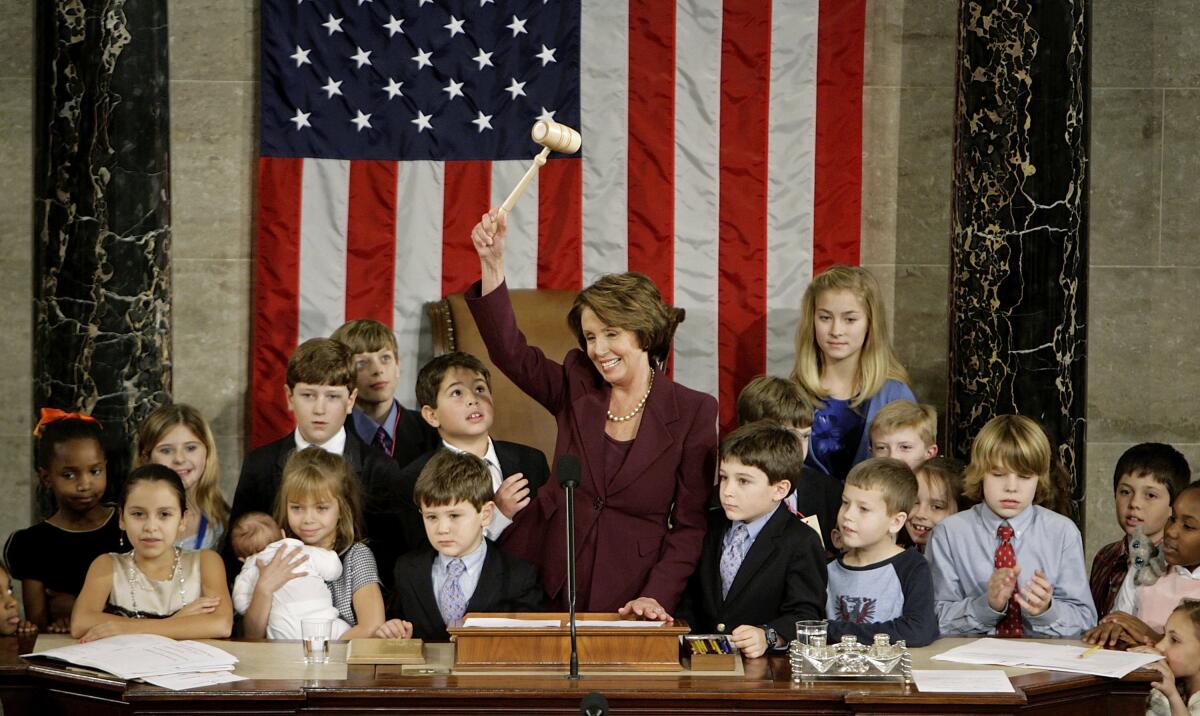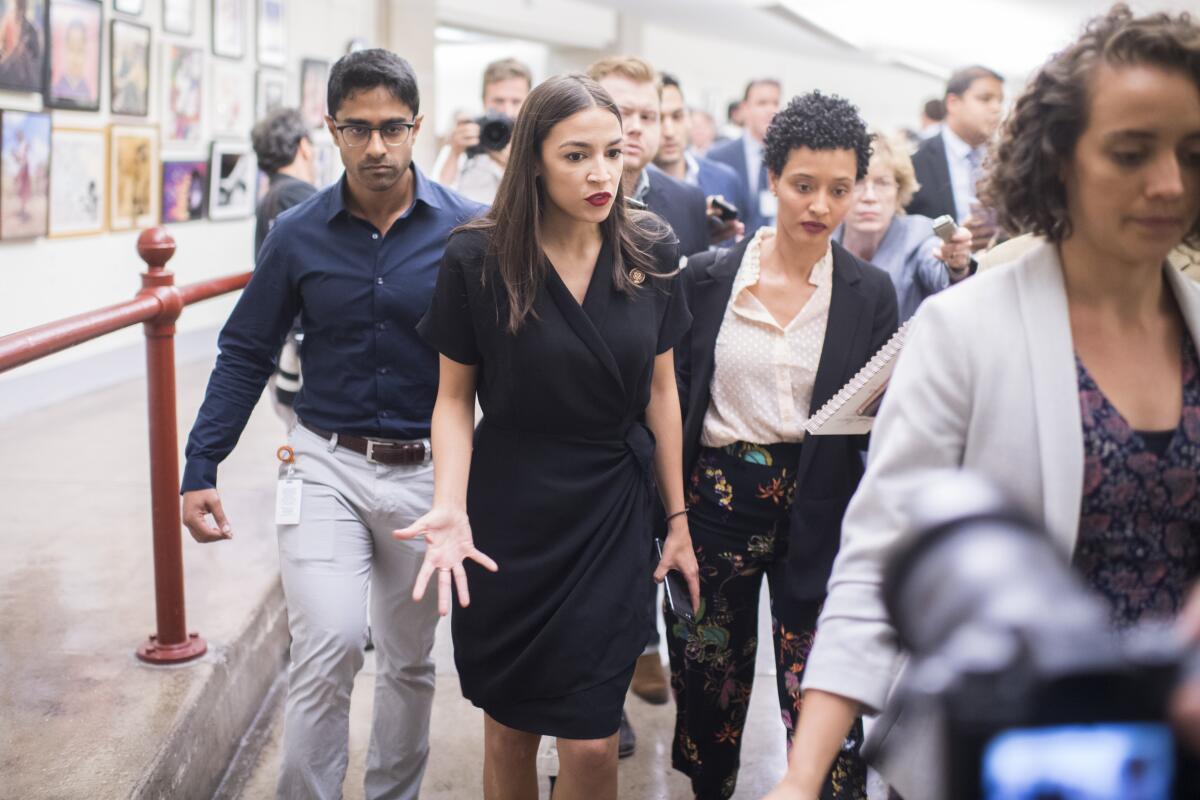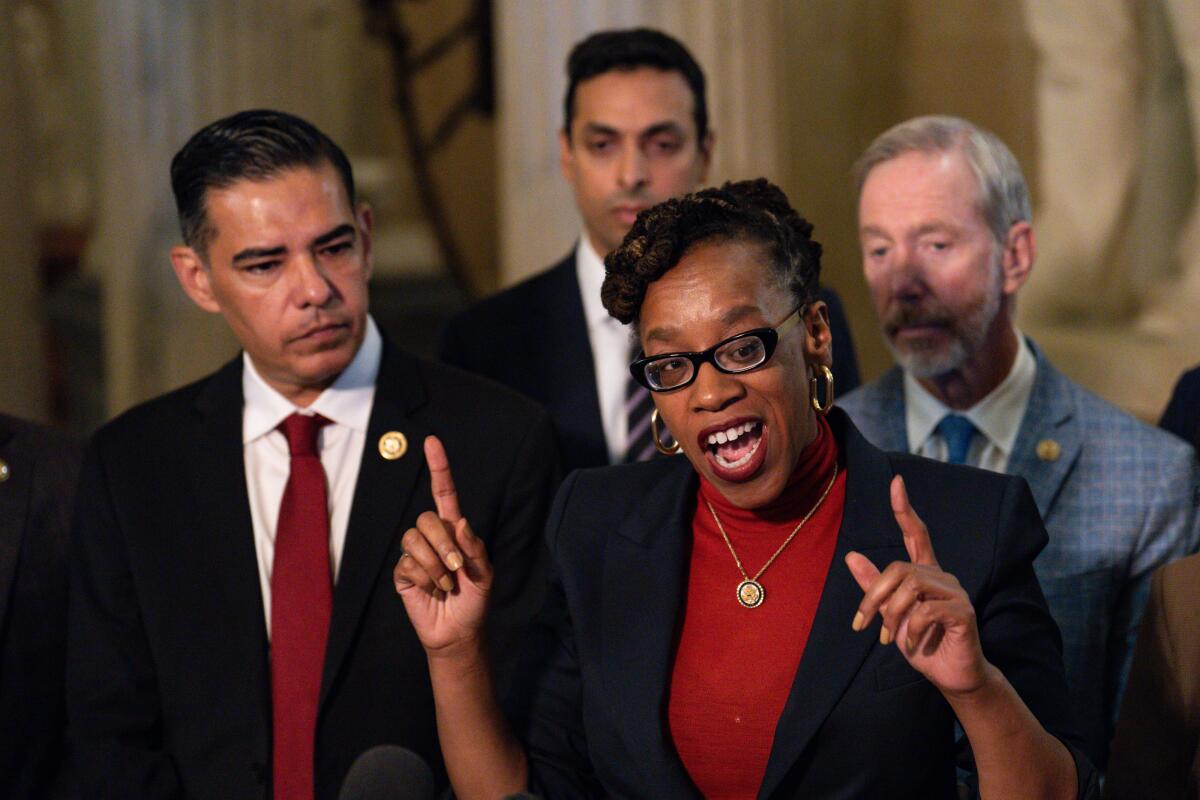SAN FRANCISCO — State Sen. Scott Wiener couldn’t wait any longer. The once-in-a-generation political opening he’d eyed for years had arrived, he decided — whether the grand dame of San Francisco politics agreed or not.
On Wednesday, Wiener, 55, a prolific and ambitious lawmaker, formally announced his candidacy for the San Francisco congressional seat held for nearly four decades by Rep. Nancy Pelosi, 85, who remains one of the party’s most powerful leaders and has yet to reveal her own intentions for the 2026 race.
“The world is changing, the Democratic Party is changing, and it’s time,” Wiener said in an interview with The Times. “I know San Francisco, I have worked tirelessly to represent this community — delivering housing, health care, clean energy, LGBTQ and immigrant rights — and I have a fortitude and backbone to be able to deliver for San Francisco in Congress.”

State Sen. Scott Wiener (D-San Francisco) announced Wednesdat that he will run for the congressional seat currently held by former Speaker Nancy Pelosi.
(Josh Edelson/For The Times)
Wiener’s announcement — which leaked in part last week — caught some political observers off guard, given Wiener had for years seemed resigned to run for Pelosi’s seat only once she stepped aside. But it stunned few, given how squarely it fit within the broader political moment facing the Democratic Party.
In recent years, a long-simmering reckoning over generational power has exploded into the political forefront as members of the party’s old guard have increasingly been accused of holding on too long, and to their party’s detriment.
Long-serving liberal Supreme Court Justice Ruth Bader Ginsburg ruffled many Democratic feathers by declining to step down during Barack Obama’s presidency despite being in her 80s. She subsequently died while still on the court at the age of 87 in 2020, handing President Trump his third appointment to the high court.
Californians watched as the late Sen. Dianne Feinstein, another D.C. power player from San Francisco, teetered into frailty, muddled through her final chapter in Washington and then died in office at 90 in 2023. The entire nation watched as President Biden, another octogenarian, gave a disastrous debate performance that sparked unrelenting questions about his age and cognitive abilities and cleared the way for Trump’s return to power last year.

Visitors walk past a bust of U.S. Sen. Dianne Feinstein at San Francisco City Hall. The former mayor of San Francisco served in the Senate until she died in 2023 at age 90.
(Stephen Lam/San Francisco Chronicle via Getty Images)
As a result, age has become an unavoidable tension point for Democrats heading into next year’s midterm elections.
It has also been an issue for Republicans, including Sen. Mitch McConnell (R-Ky.), 83, the former Senate majority leader who has faced health issues in recent years and is retiring in 2026 after more than 40 years in the Senate. Other older Republicans are facing primary challenges for being perceived as too traditional or insufficiently loyal to Trump or the MAGA movement — including Sen. John Cornyn (R-Tex.), 73 and in office since 2002, and Sen. Bill Cassidy (R-La.), 68 and in the Senate since 2015.
For decades, many conservatives have called for congressional term limits in opposition to “career politicians” who cling to power for too long. Florida Gov. Ron DeSantis, a Republican, and David Trone, a Maryland Democrat, renewed those calls on Wednesday, announcing in an op-ed published in the New York Times that they would co-chair a national campaign to push for term limits.
However, perhaps because they are in power, the calls for a generational shake-up in 2026 have not been nearly as loud on the Republican side.
Democratic Party activists have sounded the alarm about a quickening slide into gerontocracy on the political left, blamed it for their party’s inability to mount an energetic and effective response to Trump and his MAGA movement, and called for younger candidates to take the reins — while congressional leaders in their 70s and 80s have increasingly begun weighing their options in the face of primary challenges.
“It’s fair to say the political appetite for octogenarians is not high,” said Eric Jaye, a veteran Democratic strategist in San Francisco.
“The choice in front of people is not just age,” said Saikat Chakrabarti, a 39-year-old tech millionaire and Democratic political operative who is also running for Pelosi’s seat. “We need a whole different approach and different candidates.”
“There’s like this unspoken rule that you don’t do what we’re doing in this moment. You sit out and wait your turn,” said Sacramento City Councilmember Mai Vang, 40, who has launched a primary challenge to Rep. Doris Matsui (D-Sacramento), who is 81 and has been in Congress since 2005. “But I’m not going to wait on the sidelines, because there is an urgency of now.”
A national trend
The generational shift promises to reshape Congress by replacing Democrats across the country, including some who are leaving without a fight.
Sen. Jeanne Shaheen, 78 and a senator representing New Hampshire since 2009, said in March that it was “time” to step aside.
In Illinois, Sen. Richard Durbin, 80 and a senator since 1997, and Rep. Jan Schakowsky, 81 and in the House since 1999, both announced in May that they would not run again. Durbin said it was time “to pass the torch,” while Schakowsky praised younger “voices” in the party as “so sharp.”
Rep. Jerry Nadler of New York, 78 and in the House since 1992, announced his retirement last month, saying that “watching the Biden thing really said something about the necessity for generational change in the party.”

New York City mayoral candidate Zohran Mamdani speaks at a news conference.
(Michael Nagle/Bloomberg via Getty Images)
Other older Democrats, meanwhile, have shown no intention of stepping aside, or are seeking out new roles in power.
Maine Gov. Janet Mills, 77, recently announced she is running to challenge Republican Sen. Susan Collins, who is 72 and has been in the Senate since 1997. Mills has tried to soften concerns about her age by promising to serve just one term if elected.
Sen. Ed Markey of Massachusetts, 79 and in the Senate since 2013, has stiffly rebuffed a primary challenge from Rep. Seth Moulton, 46, accusing Moulton of springing a challenge on him amid a shutdown and while he is busy resisting Trump’s agenda.
In Connecticut, Rep. John Larson, 77, who has been in office since 1999 and suffered a complex partial seizure on the House floor in February, has mocked his primary challengers’ message of generational change, telling Axios, “Generational change is fine, but you’ve got to earn it.”

David Hogg, a survivor of the 2018 mass shooting at Marjory Stoneman Douglas High School in Parkland, Fla., speaks at the 2022 March for Our Lives.
(Leigh Vogel / Getty Images for March For Our Lives)
David Hogg, a 25-year-old liberal activist who was thrust into politics by the 2018 mass shooting at his Parkland, Fla., high school, is among the party’s younger leaders pushing for new blood. He recently declined to seek reelection as the co-vice chair of the Democratic National Committee to bring primary challenges to older Democratic incumbents with his group Leaders We Deserve.
When he announced that decision in June, Hogg called the idea that Democratic leaders can stay in power until they die even if they don’t do a good job an “existential threat to the future of this party and nation.” His group fundraises and disperses money to young candidates it backs.
When asked by The Times about Pelosi and her primary challengers, however, Hogg was circumspect, calling Pelosi “one of the most effective and consequential leaders in the history of the Democratic Party.”
A shift in California
Pelosi is not the only older California incumbent facing a primary challenge. In addition to Matsui, the list also includes Rep. Brad Sherman (D-Porter Ranch), who is 70 and has been in office since 1997, and Rep. Mike Thompson (D-St. Helena), who is 74 and has been in office since 1999.
But Pelosi’s challenges have attracted more attention, perhaps in part because her departure from Congress would be the clearest sign yet that the generational shift sought by younger party activists is fully underway.

Nancy Pelosi is sworn in as House speaker in 2007, surrounded by her grandchildren and children of other members of Congress.
(Chip Somodevilla / Getty Images)
A trailblazer as the first female speaker of the House, Pelosi presided over two Trump impeachments. While no longer in leadership, she remains incredibly influential as an arm-twister and strategist.
She played a central role in sidelining Biden after his debate meltdown, and for the last couple months has been raising big money — a special skill of hers — in support of California’s Proposition 50. The measure seeks voter approval to redraw California’s congressional districts to better favor Democrats in response to Trump’s pressure campaign on Texas and other red states to redraw their lines in favor of Republicans.
Pelosi has used Prop. 50 in recent days to deflect questions about her primary challengers and her plans for 2026, with her spokesman Ian Krager saying she “is fully focused” on the Prop 50 fight and will be through Nov. 4.
Chakrabarti, who helped Rep. Alexandria Ocasio-Cortez (D-N.Y.) unseat a longtime Democratic incumbent in 2019, said he sees even more “appetite for change” among the party’s base today — as evidenced by “mainstream Democrats who have voted for Nancy Pelosi their whole life” showing up to his events.
And it makes sense, he said.
For decades, Americans have watched the cost of essentials skyrocket while their wages have remained relatively flat, Chakrabarti said, and that has made them desperate to support messages of “bold, sweeping economic change” — whether from Obama or Trump — even as long-serving, mainstream Democrats backed by corporate money have worked to maintain the status quo.

Rep. Alexandria Ocasio-Cortez leaves a news conference at the Capitol in 2019. At left is Saikat Chakrabarti, who was her chief of staff and is now a candidate for the congressional seat held by Rep. Nancy Pelosi.
(Tom Williams/CQ-Roll Call, Inc via Getty Imag)
He said it is time for Democrats to once again push bold, big ideas, which he plans to do — including Medicare for all, universal child care, free college tuition, millions of new units of affordable housing, a new economy built around climate action, and higher taxes on billionaires and mega-millionaires like him.
Wiener, who also backs Prop. 50 and would be the first out gay person to represent San Francisco in Congress, said he cannot speak to Pelosi’s thinking — or to Politico reporting Wednesday that Pelosi is considering her options and has been seen “publicly elevating” San Francisco Supervisor Connie Chan in the race — but is confident in his readiness for the role.
Wiener agreed with Chakrabarti that big ideas are needed from Democrats to win back voters and make progress. He also said that his track record in the state Legislature shows that he has “been willing to take on very, very big fights to make significant progressive change.”
“No one has ever accused me of thinking small,” he said — citing his success in passing bills to create more affordable housing, reform health insurance and drug pricing, tackle net neutrality, challenge telecommunications and cable companies and protect LGBTQ+ and other minority communities and immigrants.
“In addition to having the desire to make big progressive change, in addition to talking about big progressive change, you have to be able to put together the coalitions to deliver on that change, because words are not enough,” Wiener said. “I’ve shown over and over again that I know how to do it, and that I can deliver.”
Political analysts said a message of big ideas will clearly resonate with some voters. But they also said that Pelosi, if she stays in the race, will be hard to beat. She will also face more serious questions than ever about her age and “her ability to function at the extraordinarily high level” she has worked at in years past, Jaye said, and will “have to answer those questions.”
If Pelosi decides not to run, Chakrabarti has the benefit of self-funding and of the current party enthusiasm for fresh faces, they said, and anyone — Chan or otherwise — would benefit from a Pelosi endorsement. But Wiener already has a strong base in the district, a track record for getting legislation passed and, as several observers pointed out, a seemingly endless battery.
“Scott Wiener is an animal. The notion of work-life balance is not a concept he has ever had. He is just like a robotic working machine,” said Aaron Peskin, who served 18 years on the San Francisco Board of Supervisors, some alongside Wiener.

Rep. Lateefah Simon (D-Oakland) speaks to reporters at the Capitol in September.
(Kayla Bartkowski/Bloomberg via Getty Images)
Amanda Litman, the president of Run for Something, which supports young progressive candidates, said there is pent-up demand for a new generation of leaders, and “older Democrats, especially those in Congress, need to ask themselves, ‘Am I the best person to lead this party forward right now?’”
Rep. Lateefah Simon (D-Oakland), 48, won her seat in 2024 after longtime Rep. Barbara Lee, 79, who had been in the seat since 1998, decided to run for Oakland mayor. Simon said that to her, “it’s not necessarily about birthdays” but who can do the job — “who can govern, who can mentor and who can hold this administration accountable.”
As a longtime community activist who worked with youth, Simon said she is “extremely excited” by all the energy of young Democratic office seekers. But as a freshman in Congress who has leaned on Lee, Pelosi and other mentors to help her learn the ropes, she said it’s also clear Democrats need to “have some generals who are really, really tried and tested.”
“What is not helpful to me in this moment,” Simon said, “is for the Democrats to be a circular firing squad.”




